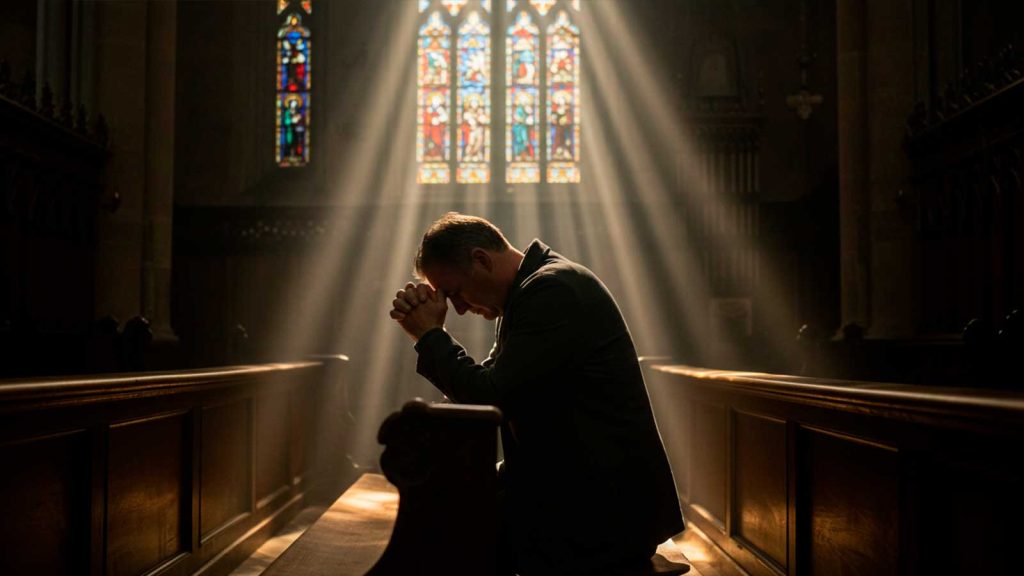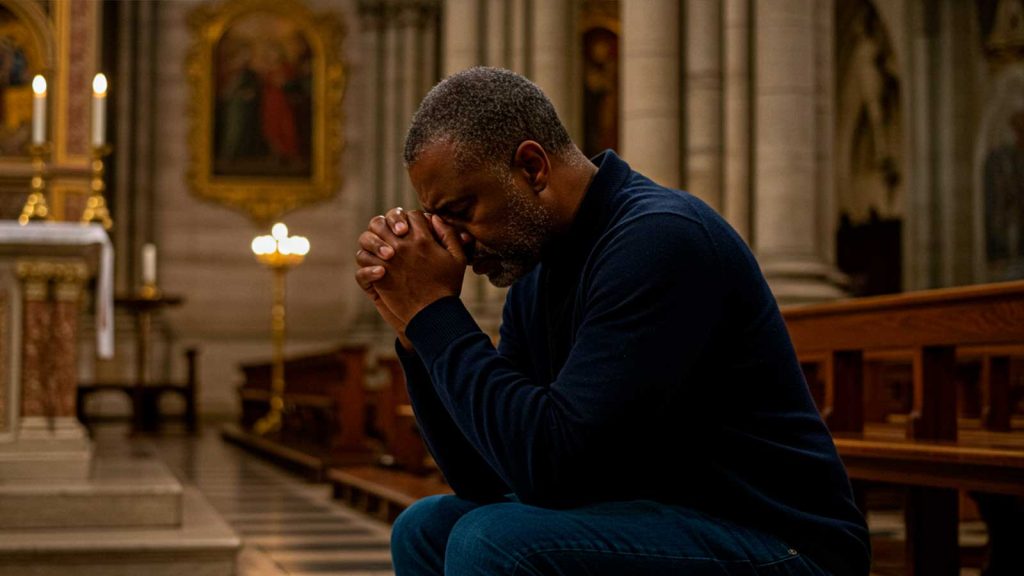Psalm 21
The Psalm 21 is a hymn of celebration, attributed to King David, that expresses deep gratitude for the victories granted by God. Unlike the psalms of supplication or lament, this one stands out for its atmosphere of joy and recognition of the divine power that sustains the kings and leads them to conquest.
In this article, we will dive into the meanings, symbolism, and lessons present in Psalm 21, exploring it verse by verse, its historical context, interpretations, and practical applications for today.
Complete Psalm 21
¹ The king rejoices in your strength, O Lord; and in your salvation he greatly exults.
² You have granted him the desire of his heart, and have not withheld the requests of his lips. (Selah.)
³ For you meet him with the blessings of goodness; you crown his head with a fine gold diadem.
⁴ You have given him life, and your tender care sustains him, lengthening his days forever and ever.
⁵ Great is his glory through your salvation; you have set splendor and majesty upon him.
⁶ For you have blessed him forever; you have filled him with joy by your presence.
⁷ Because the king trusts in the Lord, and by the mercy of the Most High he will not falter.
⁸ Your hand will reach all your enemies, your right hand will seize those who hate you.
⁹ You will make them like a furnace of fire in the time of your wrath; the Lord will consume them in his indignation, and fire will devour them.
¹⁰ You will destroy their offspring from the earth, and their descendants among the children of men.
¹¹ For they have intended evil against you; they have devised a cunning plan, but they shall not prevail.
¹² For you will turn their backs, and with your arrows arranged in battle you will point them straight to the face.
¹³ Exalt yourself, O Lord, in your strength; then we will sing and praise your power.
The Importance of Psalm 21 in Spiritual Life
Psalm 21 has been used by believers in moments of gratitude, especially after great personal, professional, or spiritual victories. It reinforces the idea that all success comes from on high and that trusting in God is never in vain.
A Psalm of Royal Gratitude
David does not hide his emotion when he acknowledges that his strength does not come from swords, but from God’s help. The text teaches us to recognize blessings and to celebrate with humility.
Contemporary Applications of Psalm 21
Today, Psalm 21 can be recited by those who have overcome emotional battles, work challenges, or family struggles, and now reap the fruits of overcoming adversity.

Explanation of Psalm 21 Verse by Verse
Verse 1
The king rejoices in your strength, O Lord; and in your salvation he greatly exults.
The psalm opens with a tone of celebration. The king acknowledges that his joy comes from the Lord’s strength and that it is in divine salvation that he finds a true reason to rejoice. This strength is not merely physical, but also spiritual, emotional, and strategic—it is the force that leads to victory.
Verse 2
You have granted him the desire of his heart, and have not withheld the requests of his lips. (Selah.)
Here, the psalmist shows that God is a Father who hears and answers prayers. The king’s desires were met because he trusted and asked sincerely. The “Selah” invites a pause and reflection on God’s faithfulness.
Verse 3
For you meet him with the blessings of goodness; you crown his head with a fine gold diadem.
God not only hears but also takes the initiative to bless. The image of the gold diadem symbolizes honor, authority, and heavenly recognition. God’s goodness is manifested in a visible and abundant way.
Verse 4
You have given him life, and your tender care sustains him, lengthening his days forever and ever.
The king asked for life, and God provided more than he expected: longevity that transcends time. This verse suggests not only prolonged physical life but also an eternal heritage.
Verse 5
Great is his glory through your salvation; you have set splendor and majesty upon him.
The king’s glory comes from divine salvation. God not only delivers but also exalts, endowing the faithful with glory and majesty that go beyond mere appearances—they are reflections of heavenly favor.
Verse 6
For you have blessed him forever; you have filled him with joy by your presence.
God’s blessing is continuous. It is in the presence of the Lord—His “face”—that true joy is found. This joy does not depend on circumstances but on the intimacy with the Creator.
Verse 7
Because the king trusts in the Lord, and by the mercy of the Most High he will not falter.
Trust is the foundation of stability. Those who trust in God remain steadfast, not because they are strong, but because they lean on the mercy of the Eternal and Unshakable One.
Verse 8
Your hand will reach all your enemies, your right hand will seize those who hate you.
God’s hand represents His power and justice. No enemy escapes His authority. Those who oppose the Lord or His anointed shall be reached by divine judgment.
Verse 9
You will make them like a furnace of fire in the time of your wrath; the Lord will consume them in his indignation, and fire will devour them.
This is where God’s judgment is described in symbolic and intense language. The “furnace of fire” displays the severity of the punishment for those who rise against Him. It is a clear warning that evil has its consequences.
Verse 10
You will destroy their offspring from the earth, and their descendants among the children of men.
God deals not only with actions but also eradicates evil at its root. The “offspring” and the “seed” of the wicked are eliminated, which signifies the end of their influence and legacy.
Verse 11
For they have intended evil against you; they have devised a cunning plan, but they shall not prevail.
The enemies have plotted against God and His people, but their plans fail. No conspiracy can prosper when God is in control. This verse reinforces divine sovereignty over all human designs.
Verse 12
For you will turn their backs, and with your arrows arranged in battle you will point them straight to the face.
The enemies will be forced to flee, yet they will still be struck. The arrows represent the precision of God’s judgment, which acts with inevitable and complete justice.
Verse 13
Exalt yourself, O Lord, in your strength; then we will sing and praise your power.
The psalm concludes with a cry of worship. The community recognizes that all victory belongs to God and promises to continue exalting His power. It is a conclusion that transforms the lived experience into continuous praise.

Symbolism Present in Psalm 21
The Psalm 21 is filled with symbolic images that reveal the depth of the relationship between the king and the Lord, as well as convey spiritual truths that surpass the historical context. These elements are not mere poetic adornments, but expressions that communicate God’s character, His power, and His covenant with those who serve Him faithfully.
The Fine Gold Diadem
One of the most striking symbols in Psalm 21 is the gold diadem placed upon the king’s head. More than a human token of prestige, this diadem represents divine approval and anointing. It is God who bestows authority, not men. This image reinforces that all legitimate leadership comes from heaven and must be exercised under the guidance of the Most High.
Long and Eternal Life
When the king asks for life and receives a long duration of days, the text reveals a desire that goes beyond mere earthly survival. The symbolism here points to a blessed, stable, and enduring life—fruit of God’s faithfulness. The longevity in Psalm 21 also refers to the idea of a perpetual covenant, a continuity that spans generations and symbolizes the eternal blessing reserved for those who trust in the Lord.
Fire as Judgment
In the final verses of Psalm 21, the enemies are compared to fuel in a blazing furnace. This fire is not random destruction but the manifestation of divine justice. It symbolizes purification and judgment against wickedness. In this context, fire reveals that God does not tolerate iniquity and acts with power and righteousness against those who oppose His will.
The Right Hand of God
Although mentioned less prominently, the right hand referenced in Psalm 21 represents God’s active power in favor of the righteous and against the enemies. It is a classic biblical symbol of strength, authority, and divine intervention, indicating that the Lord is not indifferent to what happens but acts directly in human history.
These symbols make Psalm 21 a source of inspiration not only for its words but also for its powerful imagery. They speak to the heart and mind, inviting the reader to trust in the just and merciful governance of God.
Practical Lessons We Can Learn from Psalm 21
Recognize God’s Favor
We should not attribute victories solely to our own effort. Recognizing the divine hand helps us remain humble.
Trust Before the Response
Psalm 21 celebrates the blessings already received but also makes it clear that trust must come before achievements.
Praise at All Times
Even after victory, praise continues. This teaches that gratitude should be a permanent state of mind.
When and How to Use Psalm 21
After a Personal Conquest
Many turn to Psalm 21 to give thanks for emotional healing, a promotion at work, or overcoming an obstacle.
In Prayers of Thanksgiving
Reciting it as part of a moment of gratitude is a way to reaffirm faith and acknowledgment of divine help.
As Inspiration for New Challenges
Before facing new goals, rereading Psalm 21 can serve as a reminder that God remains the same: present, mighty, and faithful.

Interesting Facts About Psalm 21
Psalm 21 holds special significance both in its historical context and in the spiritual tradition of Jews and Christians. More than a simple prayer of thanksgiving, it carries unique elements that set it apart among the hymns of victory in the Scriptures. Here are a few interesting facts that further enrich the reading and understanding of this powerful psalm:
The Thematic Continuation of Psalm 20
Psalm 21 is widely considered a natural follow-up to Psalm 20, which is a supplication made before battle. While the previous psalm expresses trust in God in the face of imminent conflict, Psalm 21 celebrates the deliverance and victory achieved. Together, they form a complete cycle of faith: prayer, trust, divine response, and gratitude.
Sung at Military Celebrations in Israel
Scholars point out that Psalm 21 was used in public thanksgiving ceremonies, especially after significant military victories. It was a national triumph hymn, exalting the king chosen by God while acknowledging that true strength came from the Lord. On these occasions, the people celebrated not only political victory but also God’s faithfulness to His people.
A Presence in Both Jewish and Christian Liturgy
In both Judaism and Christianity, Psalm 21 occupies a prominent place in liturgies that emphasize divine sovereignty and praise after moments of conquest. It is recited as an expression of gratitude, reminding believers that all authority and protection come from the Most High. Its royal and reverent tone makes it ideal for celebrations and communal worship services.
These interesting facts show how Psalm 21 goes beyond the biblical text. It is a living piece of spiritual tradition, connecting past, present, and faith—and continues to inspire hearts that recognize God’s power in every victory.

Tips for Better Studying Psalm 21
Read in Different Versions
Comparing translations can help understand different nuances in the text, such as the use of the words “salvation”, “strength”, and “trust”.
Make Personal Notes
Highlight words that catch your attention and connect them with your own experiences. This deepens understanding and creates a bond with the text.
Meditate on the Symbols
Try to imagine the scene of a king kneeling, acknowledging that all his glory comes from on high. This brings a greater spiritual impact to the text.
Psalm 21: What Is It For?
Psalm 21 serves as a powerful prayer of thanksgiving, praise, and recognition of divine sovereignty. It is especially indicated for moments after a conquest, when one wishes to express gratitude for the victories achieved with God’s help. Unlike many psalms that cry out for help, this one celebrates the fulfillment of promises and the Lord’s faithfulness.
Reasons to Use Psalm 21
- Giving thanks for personal victories: Whether in work, family life, or relationships, Psalm 21 helps to recognize that every good result comes from God.
- Strengthening faith after difficult times: After overcoming a period of trials, this psalm renews trust in God.
- Inspiring collective praise: It can be used in meetings and worship services as a celebration of the blessings received by the community.
- Reaffirming trust in the future: It also strengthens the hope that new victories will come, for God is faithful and constant in His promises.
Psalm 21 is not just an ancient hymn of victory but a living spiritual tool that helps keep the heart humble, grateful, and always connected to the divine purpose.

FAQ About Psalm 21
1. What is the main message of Psalm 21?
The trust in the power of God and the recognition that all victories come from Him.
2. Is Psalm 21 indicated for times of struggle or victory?
Primarily for moments of victory, when there is gratitude and a desire to praise.
3. What is the difference between Psalm 20 and Psalm 21?
Psalm 20 is a plea for help before battle, while Psalm 21 is a celebration of the victory granted by God.
4. Can Psalm 21 be used in corporate prayers?
Yes. Its festive tone is ideal for gatherings of thanksgiving and group celebration.
5. How can Psalm 21 be applied in everyday life?
Through constant gratitude, recognition of divine help, and trust in future battles.
Conclusion
Psalm 21 is much more than an ancient hymn of victory—it is an invitation to gratitude, trust, and the celebration of God’s work in the lives of those who depend on Him. By exploring its verses, we understand that every achievement is not merely the product of human effort but the result of the Lord’s strength, mercy, and faithfulness.
This psalm reminds us that when we place our trust in God, we are endowed with glory, protection, and lasting joy. Even amidst battles, a heart that remains steadfast in the Lord experiences deliverance, exaltation, and peace.
That is why Psalm 21 remains relevant and necessary. It teaches us to recognize from where our victories come and to maintain a constant spirit of praise. Whether after a great achievement or during moments of reflection, this psalm directs us to look up and render glory to the One who reigns supreme.
May each reading of Psalm 21 renew your faith, strengthen your hope, and inspire actions of gratitude before the presence and power of God.
READ ALSO:
- Psalm 20: The Prayer That Strengthens in Times of Battle
- Psalm 19: The Harmony Between Nature and the Divine Word
- Psalm 18 Explained: God’s Fortress Amidst Battles
FOLLOW US ON FACEBOOK
I hope you enjoyed the explanation of Psalm 21.